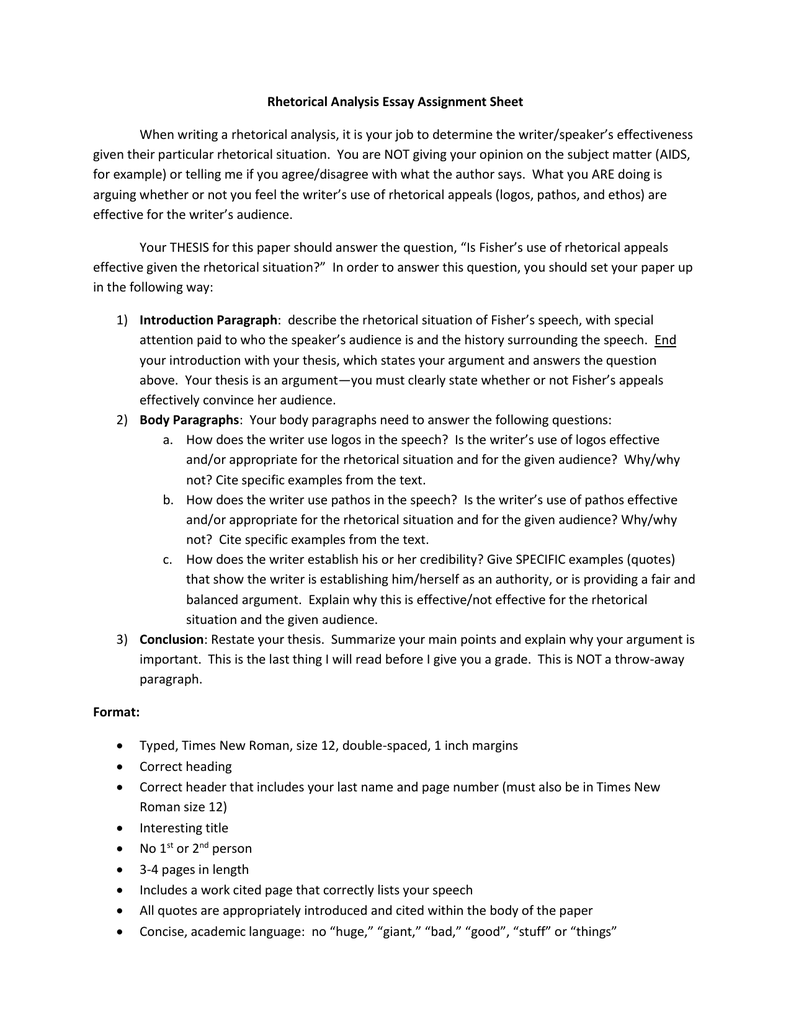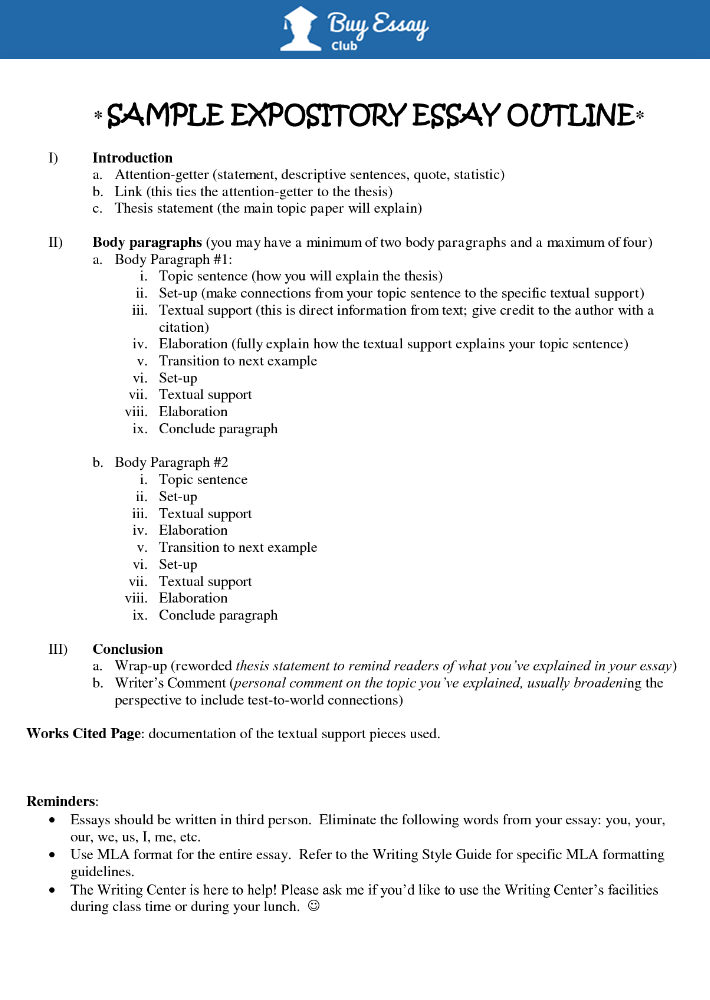Your essay should examine a rhetorical text using one of the following methodologies: – neo-Aristotelian, feminist, ideological, generic or narrative criticism. External sources may be used to help your analysis of the artifact – Any citations must follow APA 6th edition style manual and include a A Rhetorical Question Essay A rhetorical analysis essay is a form of writing where the author looks at the topic in greater detail and prove his standpoint, using effective and persuasive methods. It’s called a rhetorical question, and it can end in either a question mark or an exclamation point, and in dialogue you can sometimes even have a speaker’s rhetorical question end in a period (1) Corey McCullough ENGL & Assessment Rubric for Rhetorical Analysis Essay Audience and Purpose A good rhetorical analysis essay addresses an audience that is larger than just yourself (or your teacher). It presents the writer’s (your) unique point of view or insight to readers who can appreciate, identify with, or learn from it. It makes an intriguing point and/or provides
critical analysis; rhetorical artifact - Prime Essay Help
Understanding rhetorical writing is one thing. Writing about rhetorical writing is a whole new ball game, and it can be exhausting. No one said college was going to be easy, rhetorical analysis essay help. Read this and give it a try. Essentially, rhetoric is the art of persuasion through writing. Rhetoric is a concept that was first coined by Aristotle in Rhetorical analysis essay help Greece.
Back in his day, rhetorical analysis essay help, it was important for influential people rhetorical analysis essay help use rhetoric to help shape societies and influence change, rhetorical analysis essay help.
No one in Ancient Greece could quickly Google something when trying to think for themselves. Rhetorical strategies are used rhetorical analysis essay help every political speech, opinion article, argumentative essayand advertisement.
Politicians use rhetoric in their speeches in order to gain support from potential voters and campaigners in specific demographics. You would want to focus on the positive changes you would make within the education system or to improve child care programs because those are the topics that directly affect that specific audience.
Think about Martin Luther King, Jr. Why do you think this speech resonated with so many people and became one of the most well known speeches in history? And it worked. Rhetorical analysis essay help you know what rhetoric is.
But you may be wondering what the point of that brief rhetoric lesson was and what it has to do with your essay. The answer is quite simple: a rhetorical analysis essay is an essay in which you analyze a text for its use of rhetoric, or rhetorical writing. Make sense now? Just to be clear, your goal is not to add your opinions on the topics or dive into your standpoint or point of view on the subject.
Try using the SOAPSTone strategy. This is a strategy used to remember what elements to look for and identify when reading an article, text, or anything else. SOAPSTone stands for:. In other words, why is the author trying to convince their audience to do something or think a specific way?
Some of this you would have already done if you performed the SOAPSTone strategy outlined above, rhetorical analysis essay help. The rest you can piece together as your next step. What is the point of view the author is trying to argue? In other words, what is their point? What are they trying to get their audience to think or do? If your text is a book, movie, or other medium, when was it written or made?
What is the overall rhetorical analysis essay help of the text? For example, is it meant to scare someone into making a decision, or excite someone to join a cause? Knowing and understanding this information will help you with your analysis.
In fact, most of the time your professor will outline this information as a requirement in your instructions or rubric, rhetorical analysis essay help. Back in Ancient Greece, Aristotle used these three terms to explain how rhetoric and persuasion work. They are commonly used in the majority of persuasive writing, rhetorical analysis essay help, and even in most arguments or debates, rhetorical analysis essay help, advertisements, marketing strategies, and much more.
Pathos is the appeal to emotion. Logos is the appeal to logic. Ethos is the appeal to ethics. When using these rhetorical techniques of appeal, you can tailor the approach depending on who your audience is and what type of argument will appeal to them. You can choose to include all three appeals, or you could focus on just one if it makes more sense. They can help strengthen your argument and influence your audience to believe your point of view.
When doing a rhetorical analysis, you want to examine your article to determine the ways the author has used these techniques to appeal to their reader. Most of the time, you can tell if the author has used pathos, logos, or ethos by the way you personally respond when you read their article.
While pathos, logos, and ethos are the most common rhetorical techniques of appeal, there are also some other elements to look for within your text. Here are some other terms that are commonly used in rhetoric and the art of persuasion that should be on your radar when you analyze the text for rhetorical methods and techniques:.
For example, going back to Martin Luther King, Jr. Diction: An extremely important rhetorical technique, and writing device in general, diction refers to the style of speech or writing that an author uses. Writing style is very significant for rhetoric because a well-written, eloquent piece of writing rhetorical analysis essay help a more prominent effect, and descriptive, powerful words can leave a lasting emotional impact.
Fallacy: This is one you need to watch out for as the reader, rhetorical analysis essay help, as fallacies are often used to promote biased opinions, propaganda, deception, or manipulation. Essentially, a fallacy is the use of faulty logic or an error in reasoning. If your author is using fallacy, they are not making an effective or credible argument and are using bad rhetorical techniques.
Parallelism Repetition : Often used in speeches, parallelism involves repeating words or phrases to emphasize something and elicit an emotional response. It also leaves a more lasting impression on the audience. John F, rhetorical analysis essay help. Rhetorical Question: A very common technique used in casual conversations or arguments, a rhetorical question is a question that you ask for emphasis without expecting an answer. Tone: The tone is the attitude or atmosphere that the author takes rhetorical analysis essay help their writing, and it plays a pretty big role in how you feel while reading.
For that reason, tone is usually used to appeal to emotions. Analogy: An analogy is a comparison between two things, rhetorical analysis essay help, just like a simile. When used as a rhetorical method, an analogy is a good way to add logic to something by comparing it to something else so the reader can understand it. Before you write, start with an outline that will help you organize your thoughts and information to create a cohesive, structured paper that flows perfectly.
For a more complete breakdown of how to write a good essay from start to finish, download our free ebook. This ebook is an essay writing guide that takes you step by step through the process, from making a complete outline to finding credible sources, writing strong body paragraphs, and more.
Try to sum it up as directly as possible with a statement that covers the different methods the author uses, and their overall effectiveness. Like any introduction, your introductory paragraph should begin with a catchy hook.
Then, narrow down and work through to your thesis statement at the end. A great way to organize your body paragraphs in a rhetorical analysis essay is to section them by technique. Have one paragraph about ethos, one on pathos, and one on logos.
You can also include another paragraph about any other rhetorical techniques if you think the author has used them prominently. As you argue your points, be sure to use quotations and paraphrasing from the text to add examples.
As with any essay, you need to end things on a solid note with a good conclusion that leaves your reader with something to think about. Remember that your rhetorical analysis is exactly that: an analysis. This is especially true if you have a strong opinion about that subject. Try to leave your point of view aside and focus on the words, or you could end up losing marks for going off track. Before you get to work writing away, here are a few quick rhetorical analysis essay help to remember:.
The point of your paper is to analyze, rhetorical analysis essay help, not argue. This is a lot to take in. Our team of highly intelligent and experienced essay writers at Homework Help Global provides custom essay writing services in a variety of subjects.
Get a free quote or fill out the order form to get connected and get a Top Writer working on your paper today. Order now! June 30, By Homework Help Global In Blog No Comment Writing a Rhetorical Analysis Essay? Related Posts. Punctuation Marks and Beyond: The Ultimate Guide to English Punctuation. Ivy League Schools Everything You Need to Know About Ivy League Schools. The Influences of Social Media on Students: The Good, The Bad, and Everything in Between, rhetorical analysis essay help.
About Us How it Works FAQ Contact Us Terms of Service Privacy Policy Free Revisions Policy. Use coupon code NEW Order now!
How to Write a Rhetorical Analysis Essay - UPDATED - Coach Hall Writes
, time: 21:27Writing a Rhetorical Analysis Essay | Homework Help USA

A Rhetorical Question Essay A rhetorical analysis essay is a form of writing where the author looks at the topic in greater detail and prove his standpoint, using effective and persuasive methods. It’s called a rhetorical question, and it can end in either a question mark or an exclamation point, and in dialogue you can sometimes even have a speaker’s rhetorical question end in a period (1) Corey McCullough ENGL & Assessment Rubric for Rhetorical Analysis Essay Audience and Purpose A good rhetorical analysis essay addresses an audience that is larger than just yourself (or your teacher). It presents the writer’s (your) unique point of view or insight to readers who can appreciate, identify with, or learn from it. It makes an intriguing point and/or provides A rhetorical analysis essay is a form of writing where the author looks at the topic in greater detail and prove his standpoint, using effective and persuasive methods. In a broader sense, a rhetorical paper means 'writing about writing,' 'dreaming about a dream,' 'teaching a teacher,' and so on

No comments:
Post a Comment